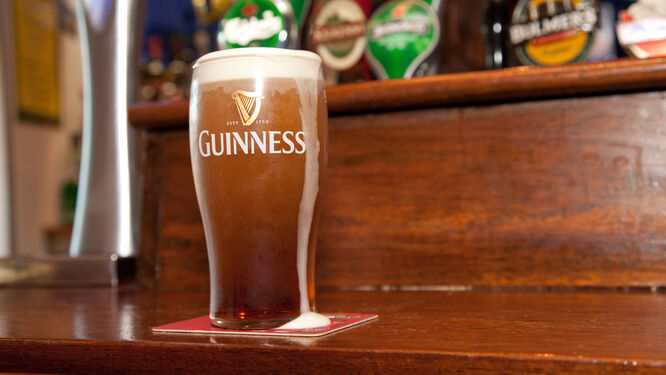Pubs: Ireland’s Watering Holes
By Rick Steves and Pat O'Connor
Pubs are a cornerstone of the Irish social scene, and whether you're a teetotaler or a beer guzzler, they should be a part of your Ireland experience. Whether in rural villages or busy Dublin, a pub (short for "public house") is an extended living room where, if you don't mind the stickiness, you can feel the pulse of Ireland.
Smart travelers use pubs to eat, drink, get out of the rain, watch the latest sporting event, and make new friends. Unfortunately, many city pubs have been afflicted with an excess of brass, ferns, and video games. Today the most traditional atmospheric pubs are in Ireland's countryside and smaller towns. I recommend certain pubs in my guidebook, and your B&B host is likely up-to-date on the best neighborhood pub grub. Ask for advice (but adjust for nepotism and cronyism, which run rampant).
Pubs are generally open daily from 11am or noon until 11:30pm. They stay open later Fridays and Saturdays but close earlier on Sundays (about 10:30pm). Children are generally welcome before 8pm (sometimes in specific sections). You must be at least 18 to order a beer.
You're a guest on your first night; after that, you're a regular. A wise Irishman once said, "It never rains in a pub." The relaxed, informal atmosphere feels like a refuge from daily cares. Women traveling alone need not worry — you'll become part of the pub family in no time.
Craic (pronounced "crack"), Irish for "fun" or "a good laugh," is the sport that accompanies drinking in a pub. People are there to talk. To encourage conversation, stand or sit at the bar, not at a table. Of course, Ireland's pubs are home to its ever-thriving traditional-music scene. Nothing makes a pub more convivial than a "trad session" (musical evening), especially if it involves a ceilidh — a friendly Gaelic jamboree of traditional dancing that most locals are happy to teach to any willing learner.
It's a tradition to buy your table a round, and then for each person to reciprocate. If an Irishman buys you a drink, thank him by saying, "Go raibh maith agat" (guh rov mah UG-ut). Offer him a toast in Irish — "Slainte" (SLAWN-chuh), the equivalent of "cheers." A good excuse for a conversation is to ask to be taught a few words of Irish Gaelic.
Here's a goofy excuse for some craic: Ireland — small as it is — has many dialects. People from Cork are famous for talking very fast (and in a squeaky voice) — so fast that some even talk in letters alone: ABCD fish? (Anybody see the fish?) DR no fish. (There are no fish.) DR fish. (There are fish.) CDBDIs? (See the beady eyes?) OIBJ DR fish. (Oh aye, by Jeeze, there are fish.) For a possibly more appropriate spin, replace the fish with "bird" (girl). This is obscure, but your pub neighbor may understand and enjoy hearing it. If nothing else, you won't seem so intimidating to him anymore.
Pub grub is Ireland's best eating value. But don't expect high cuisine; this is, after all, comfort food. For about $20, you'll get a basic hot lunch or dinner in friendly surroundings. Pubs that are attached to restaurants, advertise their food, and are crowded with locals are more likely to have fresh food and a chef than sell lousy microwaved snacks.
Pub menus consist of a hearty assortment of traditional dishes, such as…
- Irish stew (mutton with mashed potatoes, onions, carrots, and herbs)
- soups and chowders
- coddle (bacon, pork sausages, potatoes, and onions stewed in layers)
- fish-and-chips
- collar and cabbage (boiled bacon coated in bread crumbs and brown sugar, then baked and served with cabbage)
- boxty (potato pancake filled with fish, meat, or vegetables), and
- champ (potato mashed with milk and onions).
"Chicken goujons" are what we'd call chicken fingers. Irish soda bread nicely rounds out a meal. In coastal areas, try seafood, such as mackerel, mussels, and Atlantic salmon. There's seldom table service in Irish pubs; order drinks and meals at the bar. Pay as you order, and only tip (by rounding up to avoid excess coinage) if you like the service.
When you say "a beer, please" in an Irish pub, you'll get a pint of Guinness (the tall blonde in a black dress). If you want a small beer, ask for a glass, which is a half-pint. Never rush your bartender when he's pouring a Guinness. It's an almost-sacred two-step process that requires time for the beer to settle.
The Irish take great pride in their beer. At pubs, long hand pulls are used to draw the traditional, rich-flavored "real ales" up from the cellar. These are the connoisseur's favorites: They're fermented naturally, vary from sweet to bitter, and often have a hoppy or nutty flavor. Short hand pulls at the bar mean colder, fizzier, mass-produced, and less interesting keg beers. Stout is dark and more bitter, like Guinness. If you think you don't like Guinness, try it in Ireland. It doesn't travel well and is better in its homeland. Murphy's is a very good Guinness-like stout, but a bit smoother and milder. For a cold, refreshing, basic, American-style beer, ask for a lager, such as Harp. Ale drinkers swear by Smithwick's (I know I do). Caffrey's is a satisfying cross between stout and ale. Craft microbrews are beginning to make inroads in Ireland. Try the draft cider (sweet or dry)…carefully. The most common spirit is triple-distilled Irish whiskey. Teetotalers can order a soft drink.
In 2004, the Irish government passed a law making all pubs in the Republic smoke-free. Smokers now take their pints outside, turning alleys into covered smoking patios. An incredulous Irishman responded to the law by saying, "What will they do next? Ban drinking in pubs? We'll never get to heaven if we don't die."
Pat O'Connor is the co-author of the Rick Steves Ireland guidebook.

